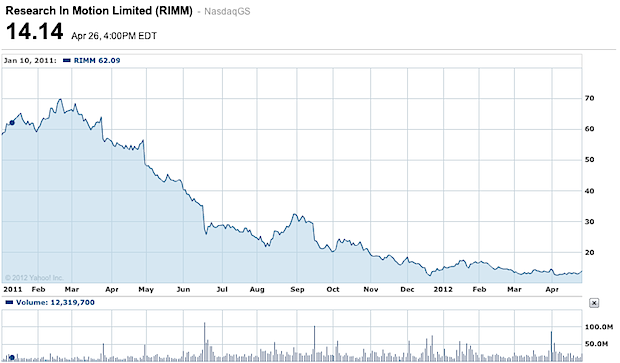Can RIM bounce back? Take the long view, investor says

BlackBerry-maker Research in Motion, which has fallen on hard times in the past year, could take upwards of five years to recover, according to one analyst. That is, if it even gets that far.
Investor Prem Watsa, whose FairFax Financial took a five percent stake in RIM last year, told Reuters that it's entirely possible for the company to bounce back from a year of poor sales, a crippling global network outage and rebelling shareholders.
It's a bold claim: the value of the company's shares has dropped more than 70 percent over the past 12 months as rivals Apple and Google eat away at its core business customer base with consumer devices that are more easily switch between work and home lives.
Is RIM experiencing a few (major) bumps in the road? Or is the company truly up the creek without a paddle?

There are two things that may keep the company from falling to its knees, according to Watsa: RIM has no long-term debt, and it still has $2.1 billion in cash on hand. If the company is looking for a comeback, it's a strong position from which to start.
And the BlackBerry brand still holds weight in RIM's most important markets, notably the U.K. with 8 million and Indonesia with 7 million subscribers, respectively. Shares jumped 4 percent on recent chatter of BlackBerry 10 hitting the market later this year, indicating there is still some energy around the company.
To overcome the hurdles, the company needs to truly understand what went wrong in the first place, and acknowledge its faltering position in the marketplace. A full-on recovery will be impossible if it is content to merely coast on what strength it has left. (Ahem, Nokia.)
Hurdle: leadership
Co-chief executives Mike Lazaridis and Jim Balsillie stepped down in January. It may have been the right decision, but it came far too late. The company needed a fresh direction long ago, and probably should have poached a high-flyer from Google, Nokia, Microsoft, or even Amazon --- even if he or she had little or no experience in the mobile industry --- rather than bumping up Siemens veteran Thorsten Heins to the chief's chair.
Normally, a chief operating officer would bring a healthy sense of corporate efficiency to the company's top spot. In this case, it's clear that RIM needs innovation, inspiration and execution. If Heins couldn't hack it before, what indicates he will now?
From what we've seen so far, Heins has talked the talk but failed to walk the walk. In fact, he can't even talk the talk: RIM's public relations department has already reneged on his comments to clarify that it would not in fact bail out on the consumer market. He set out a five-point plan of things he wanted to change, but has failed in at least two of them so far: drumming up shareholder support, and making the company more marketing driven. The other three simply remain to be seen.
Hurdle: momentum
ComScore figures show that HTC replaced RIM in global market share in the three months between November and February. HTC rose to 6.3 percent, while RIM slipped as much as Google gained in the same period, by 3.2 percent. It's become clear that RIM has an image problem: Apple and Google have stolen the limelight. RIM remaining on the stage, but nobody's listening.
BlackBerry is still a powerful brand that resonates with many. Despite a handful of high-profile security flubs, it is still largely trusted. But its failure to keep up with customer tastes has caused the company to stumble in the market --- and it's seen that way. ("BlackBerry thumb" was a phenomenon seven years ago. In the minds of many, RIM is still stuck in 2005.) Evolution isn't bad, but RIM has failed to keep up with the market. It needs to be redefined, because in this sense, RIM hasn't brought anything "new" in a long time. BlackBerry 10 could change this.
Hurdle: core competencies
It's hard to fault RIM for failing to keep up with the consumer market, because it never really understood it. When consumer and business interests began to converge, it was understandable that the company would need to adapt.
But when a datacenter outage spread from London to the rest of the world, RIM failed at the one thing that hasn't changed: reliability. RIM may not stand for hip, but it needs to stand for reliability. If it doesn't have that, it's lost everything that made it attractive in the first place. Granted, the outage was unprecedented and brief in the grand scheme of things. But it had a catastrophic effect on the company's promise to its business customers: we'll be there for you when others are not.
Is there a way out?
In the mobile market, five years is a long way off and impossible to predict. For all we know, Siri will be making us coffee in the morning and humanoid Androids will be deployed to offer us foot massages.
If it wants to be a player, RIM needs to up its game now. No more delays, and no more coasting. The company is far from dead, but it needs to internalise rapid iteration, constant innovation and an unshakable focus on its core customers: business. Will RIM rebound? Not overnight. But it starts by making a five-year-plan to get there, but also building in the flexibility to adapt when the industry environment shifts in new and unpredictable ways.
It's time for RIM to get aggressive again. In the short term, that means reacting more rapidly. In the long term, that means incorporating today's changes into tomorrow's plans. But it starts with the BlackBerry 10 operating system. Get it out the door --- now.
Image credit: Yahoo Finance/ZDNet.
Related: